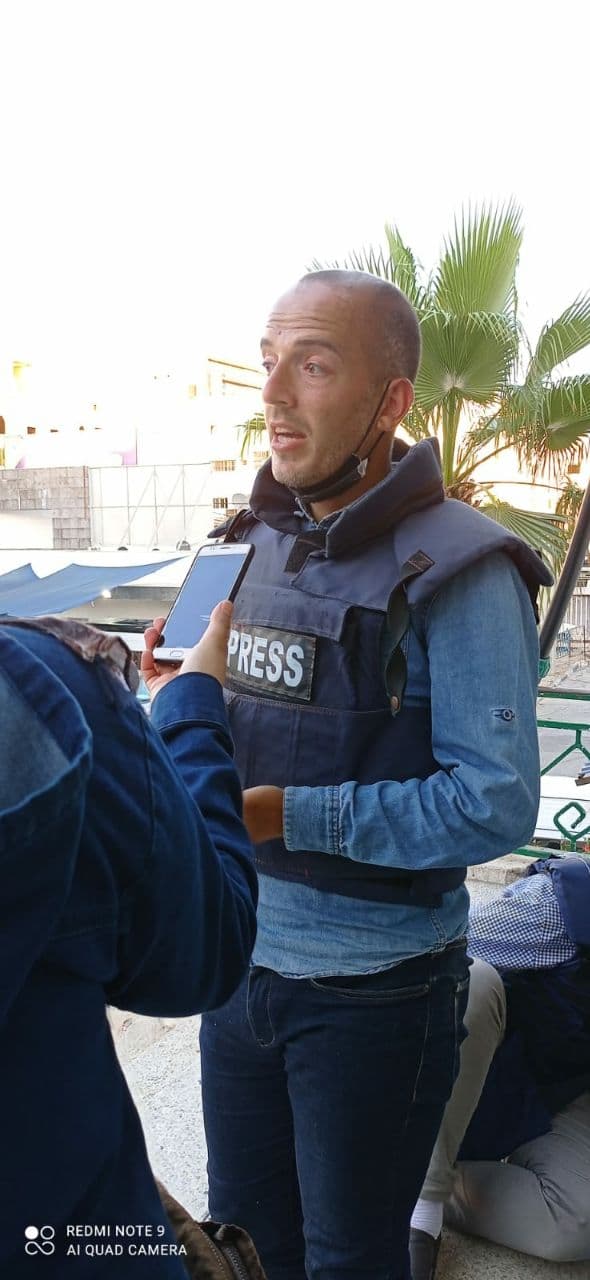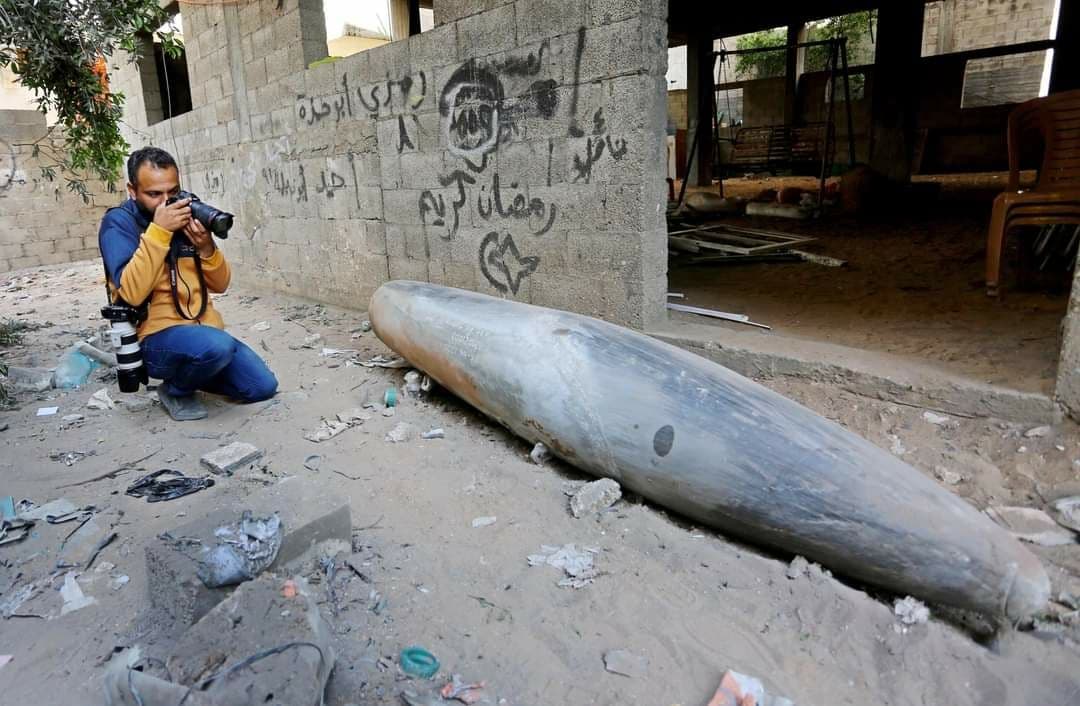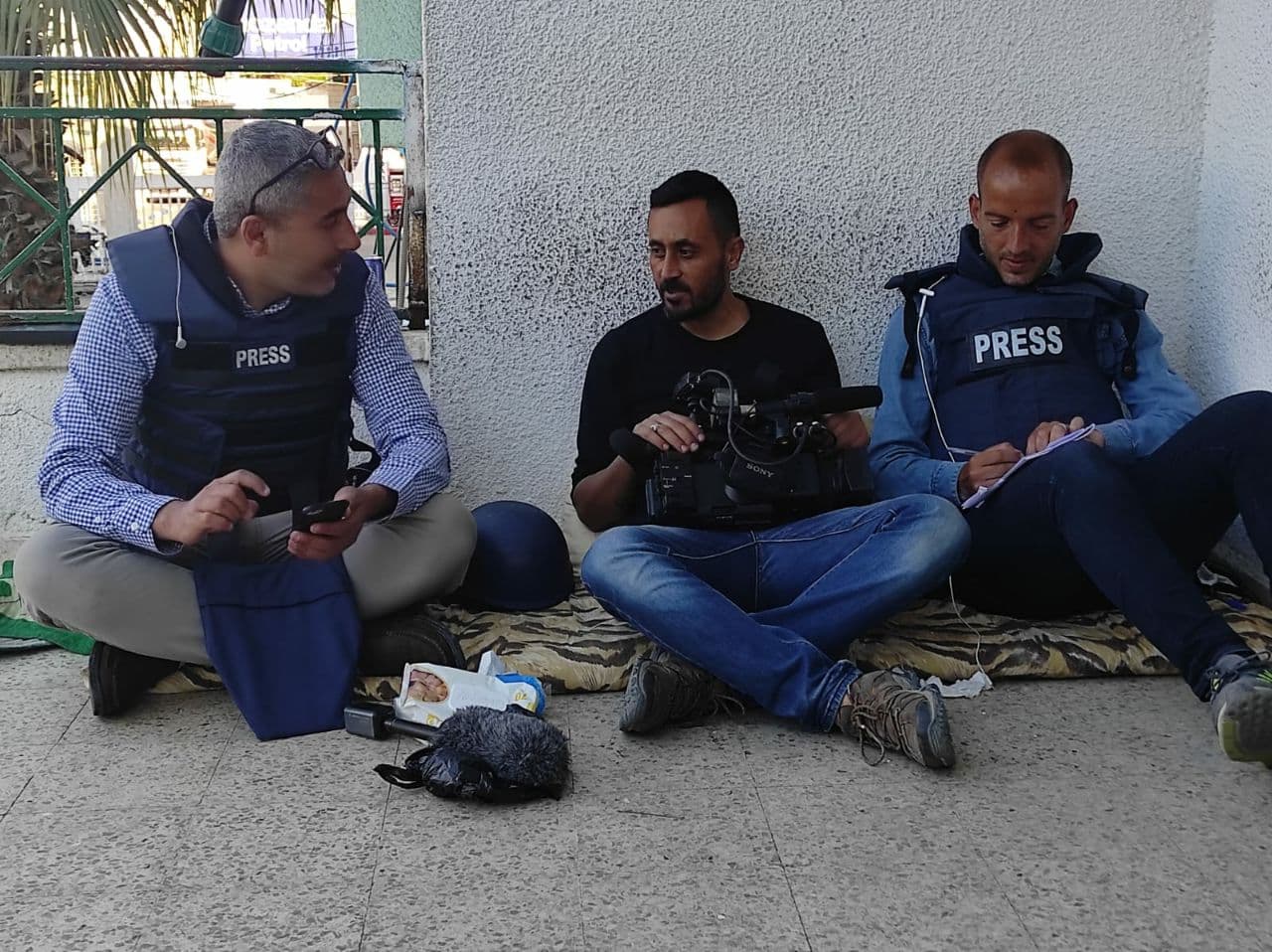يجلس مراسل التلفزيون العربي صالح الناطور في ركن ضيق بمجمع الشفاء الطبي في غزة محاولًا اقتناص بعض الوقت من أجل الراحة، فساعات عمله خلال العدوان الإسرائيلي الحالي طويلة ومتعبة، وتزداد الظروف قساوة خاصة بعد أن أضحى الناطور بلا مقر عمل إثر قصف الطائرات الحربية الإسرائيلية مكتبه الكائن في برج الجوهرة يوم 12 من مايو\أيار 2021.
الآن يقع على عاتق الناطور أن يواصل العمل بما استطاع أن ينجو به من معدات وكاميرات وأجهزة، وعليه أن يبقى في ميدان عمل مليء بالتحديات من أجل إيصال الحقيقة بالصوت والصورة. وعليه -كجميع الصحفيين الميدانيين العاملين في قطاع غزة- أن يقوم بتغطية جرائم الحرب التي ترتكبها قوات الاحتلال في الوقت الذي يتعرض فيه هو نفسه لانتهاكات من طرف الاحتلال، كهدم مقر عمله أو تعريضه لخطر الإصابة.

في كل مكان "مقر عمل"
يقول صالح الناطور لِـ "مجلة الصحافة" إنه وزملاؤه يتخذون من الشوارع والمشافي والطرقات والسيارات مقرات للعمل على مدار 24 ساعة، حيث يتم التناوب على الوقوف أمام الكاميرا. وبفضل التعاون الكبير في الميدان فيما بينهم استطاعوا أداء المهام المطلوبة في ظل ضغط شديد يفرضه الهجوم العسكري على غزة.
وعن لحظات قصف مكتب التلفزيون العربي التي وثقها الناطور بالصوت والصورة، يؤكد لنا أنه لم يكن يتوقع البتة أن يتم قصف البرج، وأن يُفرض عليه خلال دقائق، ترك كل شيء في المكان والنجاة بنفسه. ويقول: "المكتب بالنسبة للصحفي هو بيته الثاني، يقضي فيه أكثر من نصف نهاره، وربما يرى فيه زملاءه أكثر مما يرى أسرته و أبناءه". ويتابع في نفس السياق: "في لحظة واحدة وجدنا أنفسنا في قلب المعركة، لا نشعر بأي تميز عن غيرنا، تحركاتنا صعبة ونحن مستهدفون في كل لحظة تمر علينا".
رغم كل هذه التحديات الصعبة يواصل الناطور العمل، وقد كان من أوائل الصحفيين الذين وصلوا إلى مكان مجزرة شارع الوحدة التي وقعت في 17 مايو/أيار الجاري، ورأى بأم عينيه جميع الشهداء والمصابين واللحظات الأولى لانعتاق الناجين وهم يتفقدون من كانوا بجوارهم قبل القصف. ويبين مراسل التلفزيون العربي: "كانت لحظة إخراج جثث الأطفال صادمة بالنسبة لي، كنت أباشر عملي وأنا أتخيل أبنائي في حالهم".
يقطن الناطور في منطقة قريبة من مركز شرطة مهدد بالقصف، لذا في كل خروج له للعمل يستودع الله أسرته، ويخالجه الخوف طيلة ساعات عمله على حال أسرته، كما لا يفارقه مشهد ابنه آدم (أربع سنوات) وهو يضع بقوة يده على آذانه كي لا يسمع صوت القصف. يعقب الناطور: "هاتان اليدان الصغيرتان كانتا تسارعان لاحتضاني، لكن الآن لهما مهام أخرى".
الصحفيات في الميدان
"نحن ستاند آب 24 ساعة في اليوم". بهذه الجملة بدأت مراسلة قناة فرانس 24 في غزة مها أبو كاس حديثها لِـ "مجلة الصحافة"، فعلى مدار عشرة أيام من العدوان الاسرائيلي على غزة، تواصل مها، وبهمة عالية، متابعة التطورات في القطاع في بث مباشر وخلف الكاميرا أيضا.
وفي الميدان، يمر على أبو كاس الكثير من المواقف المؤلمة التي تأثر بها بشكل كبير، وتخبرنا أنها تشعر بالألم حين تشهد لحظة وداع الأهل لمن فقدوهم من شهداء في المستشفيات، أو لحظات تعرف الأهل على الشهيد في المشرحة، وتصفها بأنها "لحظات مدمرة".
تقر أبو كاس أن عاطفتها كامرأة كثيرًا ما تظهر على الكاميرا حين لا تستطيع تمالك نفسها وهي تروي حكاية مؤلمة لضحايا العدوان الإسرائيلي، إلا أنها تؤكد أن دورها مماثل لدور المراسل الرجل، بل أحيانًا تتفوق عليه، بدليل ما نراه من جهد للصحفيات الفلسطينيات اللواتي يغطين ما يجري في قطاع غزة. وتضيف: "أرى بعض المراسلات لا يذهبن لبيوتهن البتة خلال هذا العدوان ويقضين كل الوقت في الميدان".
لا تنكر أبو كاس أنها تشعر بالخوف، خاصة في هذا العدوان الذي بدأه الاحتلال باستهداف الأماكن التي يتواجد بها الصحفيون، وكذلك الشوارع الرئيسية التي كانوا يتحركون عبرها لتغطية أماكن الأحداث. وتخبرنا عن ذلك "الشعور بأننا مستهدفون (كصحفيين) يتملكنا في كل خطوة، وهو شعور يجعل إيصال الرسالة صعبًا، لكن علينا أن نجتهد للتغلب على ذلك".
حين تذهب أبو كاس الأم إلى بيتها لاقتناص بعض الوقت من أجل الراحة، تتلقفها الصغيرة "إيلياء" (خمس سنوات) بكل شوق وخوف، وحين تسمع صوت القصف وهي في المنزل، تحاول أن تحمي صغيرتها بوضع كل ما تطاله يداها من وسائد وفراش عليها لتقيها من ركام تخشى أن يتطاير عليها.

مواصلة العمل دون مقومات
ما يزال مشهد جلوس المصور الصحفي أشرف أبو عمرة في مكتبه الكائن في برج الجوهرة لا يفارق مخيلته. كان يصله في الصباح الباكر وفيه يجهز خطته اليومية للخروج إلى الميدان، وفي الظهيرة يعجل لتحرير ونشر ما التقطه من صور للأحداث في ربوع قطاع غزة.
لم يعد الحال كما كان، فقد قُصف البرج السكني الذي كان يضم مكتب وكالة أسوشييتد بريس التي يعمل بها أبو عمرة منذ سبع سنوات، ومنه غطى العدوان الإسرائيلي على غزة خلال الأعوام 2008 و2012 و2014، وبالكاد استطاع أبو عمرة أن يخرج من المكتب وهو يحمل كاميرا واحدة من معداته، وعن هذه اللحظة يقول بلهجته العامية: "والله بكيت أمام الجميع.. ما بهون ".
تحت أنقاض البرج الذي يتكون من 14 طابقًا، تتواجد الآن معدات أشرف وأجهزة تتعلق بعمله الصحفي، حرص على جمعها منذ سنوات، وكذلك ذكريات وأرشيف كبير، لكنه لم يكن أمامه خيار إلا المواصلة: "نعمل بدون مقومات وأجهزة، ويجب ألا نتوقف لأهمية الصورة مهما كانت الظروف خطرة وفيها تحدٍّ كبير".
في الليل والنهار يسارع أبو عمرة للوصول إلى أماكن القصف، وقد كان من أوائل الصحفيين الذي سجلوا بالتفاصيل ما حدث في مجزرة عائلة أبو حطب في مخيم الشاطئ غرب قطاع غزة. "كانت الصورة قوية لدرجة أن العالم كله تأثر بما حدث بفعل الصورة التي رأى فيها بشاعة الاحتلال"، يقول لـ "مجلة الصحافة" ويضيف: "أعمل في المجال الصحفي منذ 19 عامًا، لكني لم أر بشاعة في استخدام القوة المفرطة ضد المدنيين كما في هذا العدوان".
يعيش أشرف في مدينة دير بلح لكنه منذ العدوان في 10 من مايو\أيار الجاري، يتواجد في غزة المدينة، حيث الأحداث الطارئة. ورغم خوفه على العائلة فإنه "لا يستطيع أن يترك الميدان".








































